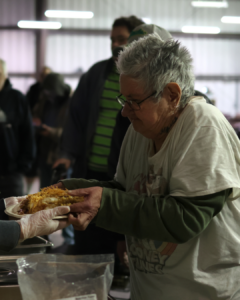
In case you missed it, on June 28 the U.S. Supreme Court issued a decision in the Johnson v. Grants Pass case that is likely to reshape many cities’ outdoor camping policies addressing unsheltered homelessness. In short, the court ruled that the city of Grants Pass — and, by extension, any other city in the Western U.S. states making up the 9th Circuit — can enforce bans on people sleeping outside on public property even when no legal shelter options exist for those experiencing homelessness.
Oregon has additional protections for unhoused individuals in the form of a 2021 state law (House Bill 3115) that limits sweeping local bans on public camping, so the degree and pace of change resulting from last week’s court ruling remain to be seen.
But we are certain of one thing here at St. Vincent de Paul Society of Lane County (SVdP): We will continue to provide space, meals, showers, shelter, support, and compassion to those in need. We believe how we care for the most vulnerable in our community speaks volumes.

As the largest nonprofit provider of human services and shelter in Lane County, we serve hundreds of unhoused individuals every day across our sites. Each person has a unique story and set of circumstances, but one unifying thread we see among them is the lack of pathways out of poverty — which exacerbates the growing homelessness crisis. We know all too well that one of the most important of those pathways is affordable housing, which remains in alarmingly short supply in our area. Every time we open one of our waitlists for SVdP affordable housing, it fills in less than 30 minutes.
With all those things in mind, we want to share some reflections by Ed Johnson, director of litigation at the Oregon Law Center and lead counsel in Johnson v. Grants Pass, about last week’s ruling in the case.
“We are disappointed that a majority of the court has decided that our constitution allows a city to punish its homeless residents simply for sleeping outside with a blanket to survive the cold when there is nowhere else for them to go,” Johnson told Willamette Week. “If cities and states continue to pursue a policing and punishment approach to people forced to live outside, it will drastically increase homelessness and cause unnecessary and unfathomable human suffering.
“While this decision is disappointing, it is important to remember that the solution to America’s homelessness crisis does not rest with the courts,” Johnson added in a statement released after the decision. “That job falls to all of us. The solution to our homelessness crisis is more affordable housing.”
